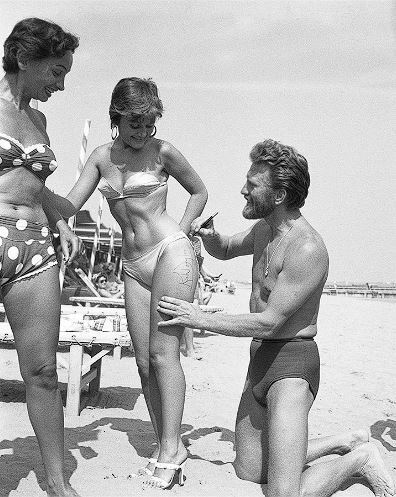Kirk Douglas, born Issur Danielovitch on December 9, 1916, in Amsterdam, New York, is one of Hollywood’s most iconic actors, with a career spanning over six decades. Known for his rugged good looks, distinctive dimpled chin, and intense screen presence, Douglas became a towering figure in the golden age of cinema. His journey to stardom, however, was anything but ordinary, and his reputation as a Hollywood “Casanova” was equally legendary.
Douglas was born to impoverished Jewish immigrants from Belarus, and his early life was shaped by hardship. He worked a series of odd jobs to support his family while dreaming of a career in acting. After winning a scholarship to the American Academy of Dramatic Arts in New York, Douglas’ talent began to shine, setting the stage for his remarkable rise.
Douglas made his Broadway debut in 1941, but his burgeoning career was interrupted by World War II. He enlisted in the U.S. Navy, serving as a communications officer in anti-submarine warfare. After the war, he returned to New York and resumed his acting career.

A chance recommendation from actress Lauren Bacall, a former classmate, led to his first film role in The Strange Love of Martha Ivers (1946). This role marked the beginning of a prolific film career, with Douglas quickly becoming known for his intensity and charisma.
Kirk Douglas rose to fame during the 1950s, earning a reputation as a versatile actor capable of handling both tough-guy roles and more complex, emotional characters. His breakthrough role came in 1949 with Champion, where he portrayed a ruthless boxer determined to reach the top. This performance earned him his first Academy Award nomination for Best Actor, establishing him as a Hollywood leading man.
Throughout the 1950s and 1960s, Douglas starred in a series of successful films, many of which are now considered classics. His portrayal of Vincent van Gogh in Lust for Life (1956) earned him another Oscar nomination, and his performance was praised for its depth and emotional intensity. Douglas’ ability to bring complexity to his characters became a hallmark of his acting.
Some of his most notable films during this era include 20,000 Leagues Under the Sea (1954), where he played the daring and adventurous Ned Land, Paths of Glory (1957), a powerful anti-war film directed by Stanley Kubrick, and Spartacus (1960), perhaps his most famous role.
In Spartacus, Douglas played the titular character, a slave who leads a rebellion against the Roman Empire. The film was a massive success and is credited with helping to end the Hollywood blacklist by hiring blacklisted screenwriter Dalton Trumbo.
Douglas wasn’t just an actor; he also became a producer, using his influence to champion projects he believed in. His role in Spartacus as both star and producer is a prime example of his willingness to take risks for creative control. This move solidified his position as one of Hollywood’s most powerful figures, both in front of and behind the camera.
While Douglas’ film career was thriving, his personal life was the subject of much gossip. He was often described as a “Casanova,” a label he neither fully embraced nor entirely rejected.
Throughout his life, Douglas was linked to numerous actresses and women in Hollywood, earning him a reputation as a ladies’ man. This image of a Hollywood playboy added to his allure, making him a magnetic figure both on and off the screen.Douglas married Diana Dill in 1943, and the couple had two sons, Michael and Joel, before divorcing in 1951. His marriage did little to quell the rumors of his affairs with co-stars and other women in Hollywood.
His relationships with actresses like Marlene Dietrich, Joan Crawford, and Rita Hayworth were the subject of tabloid headlines. His charm and rugged masculinity made him irresistible to many, and he played into this reputation with his confident, sometimes brash, public persona.
Despite his well-documented affairs, Douglas eventually found lasting love with Anne Buydens, whom he married in 1954. Their marriage, which lasted until his death in 2020, defied Hollywood norms, and they remained together for over six decades. While Douglas admitted to infidelities in his autobiography, he credited Anne with helping to stabilize his life and bring him peace.
As the years passed, Douglas transitioned from leading man to respected elder statesman of Hollywood. He continued to work into the 1980s and 1990s, often taking on supporting roles or appearing in television films. In 1991, he suffered a stroke that affected his speech, but this did not stop him from continuing to act and remain active in the industry.
Douglas’ contribution to Hollywood extends far beyond his acting roles. He is credited with helping to break the Hollywood blacklist, as well as advocating for greater creative freedom for actors and filmmakers. He received numerous accolades throughout his career, including an Honorary Academy Award in 1996 for “50 years as a creative and moral force in the motion picture community.”

In addition to his acting career, Douglas was also a philanthropist and author. He donated millions to various charitable causes, particularly in the areas of education and health. His autobiography, The Ragman’s Son, became a bestseller and provided insight into his life and career, including his well-publicized affairs and personal challenges.
Kirk Douglas’ Hollywood career is marked by iconic performances, groundbreaking achievements, and a larger-than-life persona that made him a true legend. His reputation as a “Casanova” only added to his mystique, but his lasting legacy is his contribution to cinema and his role in shaping the industry.
From his portrayal of complex, flawed characters to his efforts behind the scenes, Douglas left an indelible mark on Hollywood that continues to influence generations of actors and filmmakers. His death in 2020 at the age of 103 marked the end of an era, but his influence remains as strong as ever.


